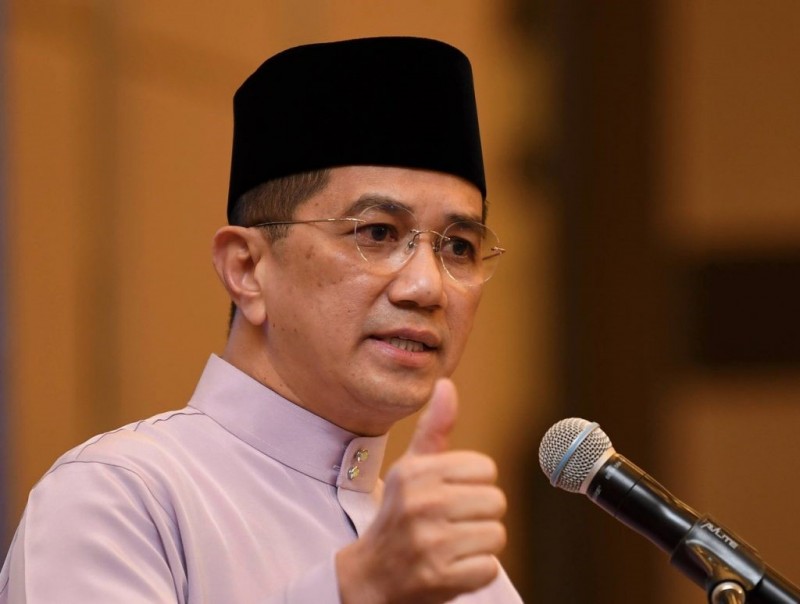
IT IS too early to assume that the Regional Comprehensive Economic Partnership (RCEP) will not benefit the country, as the purpose of agreement is to allow bigger market access to local industry players.
Senior Minister (Economy Cluster) and International Trade and Industry Minister Datuk Seri Mohamed Azmin Ali (picture) said the RCEP, which is expected to be ratified by year end or by the first quarter of 2020, will also provide opportunities for them to be more globally competitive.
He said based on the deliberations that ran for eight years, the ministry had also engaged many stakeholders — the industries, policymakers and non-governmental organisations to ensure that Malaysia will benefit from the agreement.
“Currently, our market is very small, how do you expect the local players to expand and be more competitive if they just confine themselves to Malaysian market?
“The RCEP’s 15 members represent one-third of global GDP. So, to suggest that our trade performance will decrease, I think it is too early because its purpose is to allow for bigger market access,” he said.
Azmin was commenting on The Malaysian Reserve’s report which stated that Malaysia’s goods trade balance would decline by 36% or US$4 billion (RM16.4 billion) per annum, post-RCEP.
According to a report by the Global Development Policy Centre of Boston University, Asean’s overall goods trade balance is expected to deteriorate by 6% amounting to US$8.5 billion per annum, with almost all Asean members including Cambodia, Indonesia, Laos, Malaysia, Myanmar, the Philippines, Singapore, Thailand and Vietnam seeing a decline.
Azmin was speaking to reporters after attending the Selangor statelevel Majlis Rapat Malaysia Prihatin in Shah Alam last Friday.
The event offers opportunities to the economic community in Selangor to get the latest information on initiatives provided by the MITI and its agencies to help boost the state’s economy.
Meanwhile, Bank Islam Malaysia Bhd chief economist Dr Mohd Afzanizam Abdul Rashid said the world is now seeing a greater integration.
He said it is extremely challenging if a country tries to exist without the help of its neighbours, especially in areas relating to investment and trade.
“Yes, trade and investment liberalisation could lead to imbalances, such as surplus in one country and deficits in another country.
“What matters is the liberalisation in a manner that would allow capacity building via transfers of technology and knowledge alongside the integration of the domestic economy and its trade partners.”
Mohd Afzanizam believes such endeavour is an ongoing affair to ensure multilateral trade and investment pact would be a success.
Commenting on the Business Travellers Centre (BTC) at the Kuala Lumpur International Airport (KLIA), Azmin said through the one-stop centre, the government has given approval to more than 8,000 investors among executive and technical expatriates for shortand long-term stays.
“Since the day we opened the BTC until the launching day, more than 40 individuals have been approved. In fact, on the day that I launched it, there were two travellers from Amsterdam enjoying the benefits and facilities at BTC.
“I spoke to many foreign chambers of commerce — American Malaysian Chamber of Commerce and Korean Chamber of Commerce in Malaysia — they were extremely happy for this BTC to facilitate the movement of investors,” he added.
Earlier in his speech, Azmin said more than 662,000 workers and 78,000 employers had been rescued through the Wage Subsidy Programme amounting to RM3.28 billion in Selangor alone.
He said 1.8 million Selangor residents from the bottom 40% and middle 40% disposable income groups had also received the National Prihatin Assistance worth RM2.8 billion.
“The government also championed almost 180,000 small and medium enterprises in Selangor through the Special Prihatin Grant amounting to RM532 million.
“Meanwhile, almost 9,000 small traders in Selangor were empowered with loans disbursed by the National Entrepreneurial Group Economic Fund and Bank Simpanan Nasional amounting to RM136 million. This is a ‘Prihatin’ (caring) government. This is the government that really cares about the people.”
Although the country was hit by the pandemic in early 2020, the manufacturing sector in Selangor has remained competitive and sustainable throughout 2020.
For the 2015-2020 period, Selangor has managed to attract 1,548 projects with a total investment of RM75.9 billion which has created 100,205 new job opportunities.
Source: https://themalaysianreserve.com/2021/03/29/will-rcep-benefit-malaysia/

